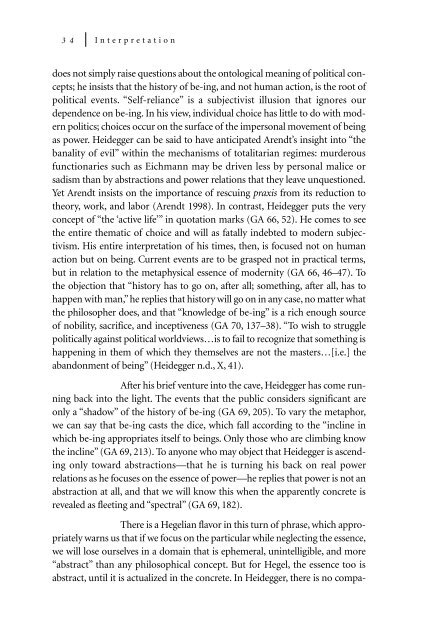Beyond Struggle and Power: Heidegger's Secret ... - Interpretation
Beyond Struggle and Power: Heidegger's Secret ... - Interpretation
Beyond Struggle and Power: Heidegger's Secret ... - Interpretation
Create successful ePaper yourself
Turn your PDF publications into a flip-book with our unique Google optimized e-Paper software.
3 4 <strong>Interpretation</strong><br />
does not simply raise questions about the ontological meaning of political concepts;<br />
he insists that the history of be-ing, <strong>and</strong> not human action, is the root of<br />
political events. “Self-reliance” is a subjectivist illusion that ignores our<br />
dependence on be-ing. In his view, individual choice has little to do with modern<br />
politics; choices occur on the surface of the impersonal movement of being<br />
as power. Heidegger can be said to have anticipated Arendt’s insight into “the<br />
banality of evil” within the mechanisms of totalitarian regimes: murderous<br />
functionaries such as Eichmann may be driven less by personal malice or<br />
sadism than by abstractions <strong>and</strong> power relations that they leave unquestioned.<br />
Yet Arendt insists on the importance of rescuing praxis from its reduction to<br />
theory, work, <strong>and</strong> labor (Arendt 1998). In contrast, Heidegger puts the very<br />
concept of “the ‘active life’” in quotation marks (GA 66, 52). He comes to see<br />
the entire thematic of choice <strong>and</strong> will as fatally indebted to modern subjectivism.<br />
His entire interpretation of his times, then, is focused not on human<br />
action but on being. Current events are to be grasped not in practical terms,<br />
but in relation to the metaphysical essence of modernity (GA 66, 46–47). To<br />
the objection that “history has to go on, after all; something, after all, has to<br />
happen with man,” he replies that history will go on in any case, no matter what<br />
the philosopher does, <strong>and</strong> that “knowledge of be-ing” is a rich enough source<br />
of nobility, sacrifice, <strong>and</strong> inceptiveness (GA 70, 137–38). “To wish to struggle<br />
politically against political worldviews…is to fail to recognize that something is<br />
happening in them of which they themselves are not the masters…[i.e.] the<br />
ab<strong>and</strong>onment of being” (Heidegger n.d., X, 41).<br />
After his brief venture into the cave, Heidegger has come running<br />
back into the light. The events that the public considers significant are<br />
only a “shadow” of the history of be-ing (GA 69, 205). To vary the metaphor,<br />
we can say that be-ing casts the dice, which fall according to the “incline in<br />
which be-ing appropriates itself to beings. Only those who are climbing know<br />
the incline” (GA 69, 213). To anyone who may object that Heidegger is ascending<br />
only toward abstractions—that he is turning his back on real power<br />
relations as he focuses on the essence of power—he replies that power is not an<br />
abstraction at all, <strong>and</strong> that we will know this when the apparently concrete is<br />
revealed as fleeting <strong>and</strong> “spectral” (GA 69, 182).<br />
There is a Hegelian flavor in this turn of phrase, which appropriately<br />
warns us that if we focus on the particular while neglecting the essence,<br />
we will lose ourselves in a domain that is ephemeral, unintelligible, <strong>and</strong> more<br />
“abstract” than any philosophical concept. But for Hegel, the essence too is<br />
abstract, until it is actualized in the concrete. In Heidegger, there is no compa-
















